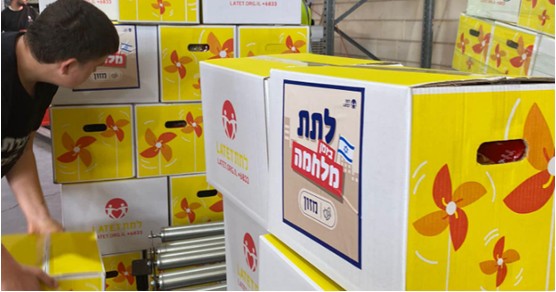About 20 percent of Israelis who responded to a survey carried out in November said their income has declined greatly or very greatly since the start of the October 7 war.
Latet’s detailed report addresses various aspects of living in poverty. The organization estimates that about 22% (710,000) families in Israel live in food insecurity, about half of them in severe food insecurity, defined as disruption of eating patterns and a reduction in the amount of food due to economic hardship

Volunteers center in Tel Aviv for displaced Gaza border community residents (Photo: Latet)
About 45 percent said they worried about experiencing economic hardship due to the war. These were among the findings of the latest edition of the Alternative Poverty Report issued Tuesday by Latet an NGO focusing on food aid. In a poll conducted by the organization, around 85 percent of respondents living in poverty reported difficulty in ensuring the supply of hot water or of the electricity needed to operate appliances in their homes. The proportion of respondents who reported being in debt rose from last year’s survey. The National Insurance Institute is expected to publish its poverty report, which is based on data from all Israelis, soon.
The estimates – which are based on one survey among a sample representative of about 500 families conducted between July and September, and a second one of a similar number of respondents during November – are higher than the latest data from the National Insurance Institute, according to which in 2021, 522,000 families lived in food insecurity. According to the report, in the first two months of the war, the nonprofit organizations distributed more than 130,000 emergency aid kits containing food and personal hygiene products.
In addition, a special report by the State Comptroller Matanyahu Englman on the absence of an economic plan by the Israeli government to fight poverty was published Tuesday. According the report, hundreds of thousands of people who were evacuated from their homes since the Gaza war started have become needy.
The report indicates that in the weeks after the war started on October 7, many Israelis felt frustrated by the lack of response from state authorities, and that even now there is no one managing government operations on the ground and coordinating between them. Most of the complaints came from the peripheral cities of Sderot, Ofakim, Kiryat Shmona, Netivot and Ashkelon, over the government’s initial hesitation to evacuate them even though they were suffering from rocket fire and the effects of the October 7 Hamas deadly attack.
When the war started, the Ombudsman’s Office opened a hotline for addressing war-related complaints. It put an emphasis on residents in conflict zones in the north and south. The report states that the office received 1,329 calls in the war’s first 43 days. Complaints dealt mainly with sheltering, educational activities, eligibility for special grants and evacuee issues.
An analysis made by Adva, a leading Israeli progressive think-and-do tank that monitors social and economic facts, of the local governments in the “Gaza envelope region”: the city Sderot and the regional councils Sha’ar HaNegev, Eshkol, Hof Ashkelon and Sdot Negev, find that they were abandoned after the war. The national budget for the years 2023-2024 provides painful evidence that the localities in question were indeed slated for abandonment following the November 2022 elections.
The total government allocation approved for the localities for 2023 and 2024, of NIS 99 million, is significantly lower than the budgets allocated and actually spent during the previous years. For example, for the years 2021 and 2022, those allocations amounted to NIS 140.5 and 137.8 million NIS, respectively.
Related: https://maki.org.il/en/?p=31455


